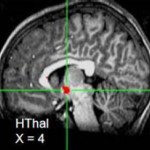
Image: Getty images
Ask middle-school students if they are popular or make friends easily, they likely will depend on social comparisons with their peers for an answer. Such reliance on the perceived opinions of others, or reflected self-appraisals, has long been assumed, but new evidence supporting this claim has now been found in the teen brain.
Using functional magnetic resonance imaging (fMRI), researchers looked at adolescent and young-adult brain activity related to both direct self-appraisals, such as “Do I think I’m smart?” and perceptions of others’ opinions — reflected self-appraisals: “Do I think my friend thinks I’m lonely?”

Hypothalamus, a node of the emotion circuit. (Credit: Image courtesy of NIH/National Institute of Mental Health)
During direct self-appraisals, researchers found that adolescents show more activity than adults in neural networks tied to self-perception (medial prefrontal and parietal cortices) and in areas linked to social cognition (dorsomedial prefrontal cortex, temporal-parietal junction and posterior superior temporal sulcus). The results, said lead author Jennifer H. Pfeifer, a psychology professor at the University of Oregon, suggest that adolescent self-perceptions depend heavily on others. [continue reading…]

Image : StockXpert
Couples who shack up before tying the knot are more likely to get divorced than their counterparts who don’t move in together until marriage, a new study suggests.
Upwards of 70 percent of U.S. couples are cohabiting these days before marrying, the researchers estimate. The study, published in the February issue of the Journal of Family Psychology, indicates that such move-ins might not be wise.
And it’s not because you start to get on one another’s nerves. Rather, the researchers figure the shared abode could lead to marriage for all the wrong reasons.
“We think that some couples who move in together without a clear commitment to marriage may wind up sliding into marriage partly because they are already cohabiting,” said lead researcher Galena Rhoades of the University of Denver.
Couples might also be nudged into nuptials because of a joint lease or shared ownership of Fido — along with other practicalities.Continue reading
Source: Live Science
A glass or two of wine a day – but no more — appears to protect older adults from developing dementia, researchers reported here at the International Conference on Alzheimer’s Disease.
Moderate alcohol intake, especially wine, has been associated with reduced risk of dementia in middle aged adults. It is not known whether this association is also true for older adults or those with mild cognitive impairment (MCI). [continue reading…]
New Research Reveals That Swearing Can Actually Increase Pain Tolerance

Researchers from Keele University’s School of Psychology have determined that swearing can have a ‘pain-lessening effect’, according to new study published in the journal NeuroReport.
While swearing is often a common response to pain, Dr Richard Stephens and his colleagues, John Atkins and Andrew Kingston, were surprised to discover that no links had been established between swearing and the actual experience of physical pain. Since swearing often has a ‘catastrophising’ or exaggerating effect, serving to embellish or overstate the severity of pain, Stephens and his team hypothesised that swearing would actually decrease the individual’s tolerance of pain. [continue reading…]




